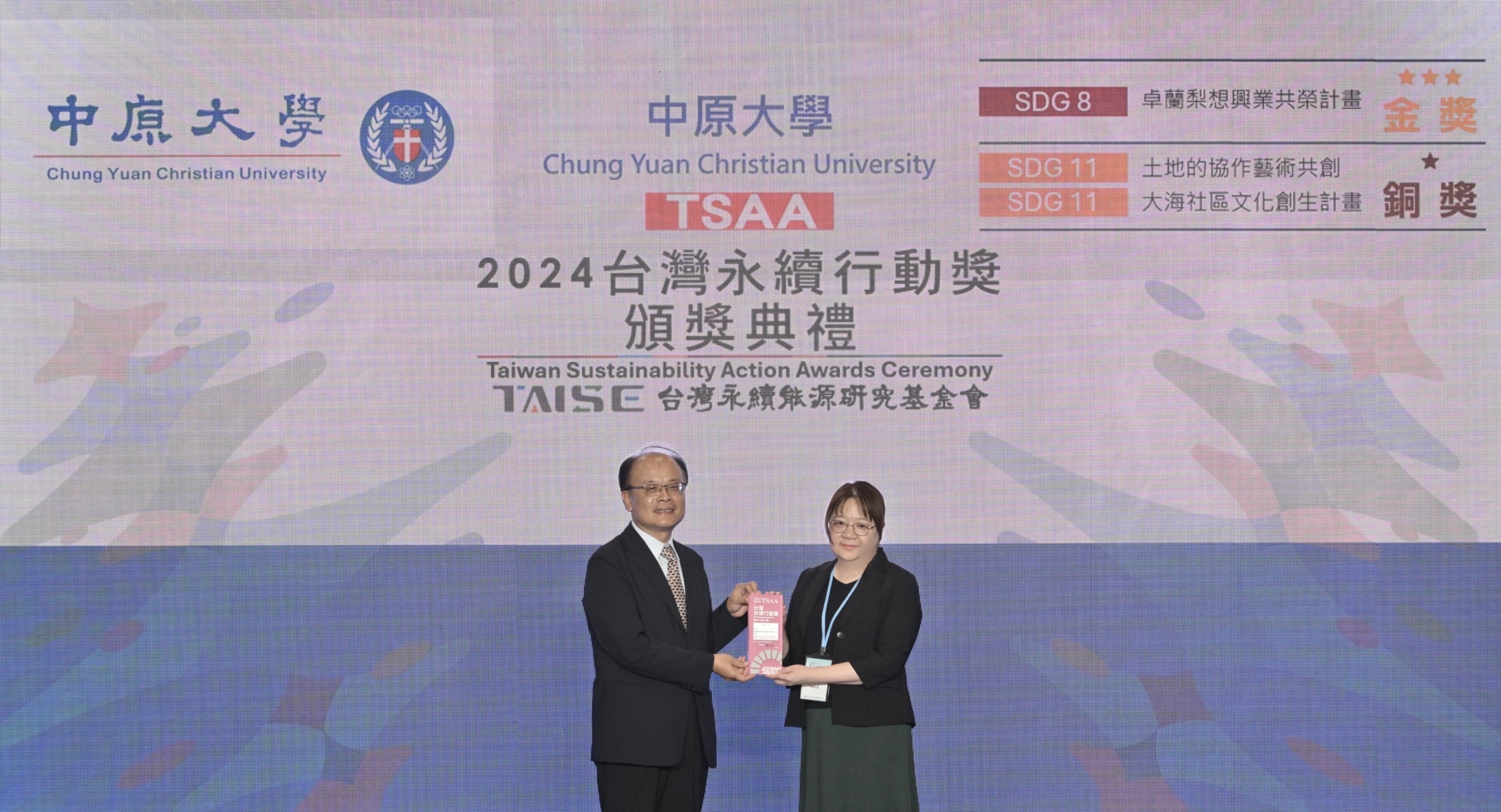Chung Yuan Christian University (CYCU) is dedicated to promoting environmental education and practicing sustainable development, encouraging faculty and students to engage deeply with the community and cultivate the sustainable talents needed for the future. The university not only earned a spot in the “QS World University Sustainability Rankings,” becoming the only private university in Taiwan to be listed, but also achieved remarkable success at the Taiwan Sustainability Action Awards on August 8th. CYCU received one gold and two bronze awards for its outstanding projects: “Zhuolan Pear Industry Prosperity,” “Collaborative Art of Land,” and “Cultural Regeneration of the Sea Community.”
The 2024 Taiwan Sustainability Action Awards (TSAA), organized by the Taiwan Institute for Sustainable Energy (TAISE), received 507 submissions for this fourth edition, with enthusiastic participation from 119 companies, 36 universities, 20 hospitals, and 43 government agencies. The awards ceremony took place on August 8th at Taipei World Trade Center Hall 1, in conjunction with the third “2024 Asia-Pacific Sustainability Expo.”

Chung Yuan Christian University received several prestigious awards, including the Gold Award for the “SDG08 Zhuolan Pear Industry Prosperity Project,” the Bronze Award for the “SDG11 Collaborative Art of Land,” and the Bronze Award for the “SDG11 Cultural Regeneration of the Sea Community.” Professor Wang Yu-Chun, Director of Sustainability and a faculty member from the Department of Environmental Engineering, accepted the awards on behalf of the university. Professor Wang emphasized, “These achievements not only recognize Chung Yuan Christian University’s ongoing efforts in sustainable development but also embody our concrete practice of social responsibility. Each award symbolizes our unwavering commitment and action in promoting environmental protection, community development, and economic sustainability.”

Professor Wang Yu-Chun, Director of Sustainability and a faculty member of the Department of Environmental Engineering at Chung Yuan Christian University, stated that in order to foster mutual growth with the local community, the university has continuously promoted the Taoyuan Region Sustainable Development Alliance among schools, sharing its expertise in sustainable education and management with high schools. Additionally, the university organizes a variety of sustainability development camps across different departments, supported by the Ministry of Education’s USR (University Social Responsibility) program. These activities encompass diverse areas such as local revitalization, community reconstruction, agricultural development, care for the underprivileged, and cultural heritage preservation, all aimed at driving social practice.
Chung Yuan Christian University has been deeply involved in Zhuolan for over seven years, successfully transforming a rural elementary school, once on the verge of closure, into a vibrant space with local characteristics, diverse teaching approaches, and a strong focus on community care. The university has undertaken a series of sustainable actions across education, community, and industry. These include developing locally-tailored curricula, providing dedicated school buses for rural students, organizing cultural and artistic activities, supporting agricultural circular economy models and carbon sequestration benefits, and collaborating with local governments to promote tourism and integrate agricultural industries. These efforts are aimed at actively establishing a replicable model of innovative economic growth.

The “Collaborative Art of Land” project was a joint creation between the Department of Architecture at Chung Yuan Christian University and the Art Program at Taitung Girls’ High School, completed over a span of seven months. The artwork, titled The Vanishing Ship and Landscape, was crafted using materials such as flat iron, galvanized iron pipes, and woven aluminum sheets. This interdisciplinary collaboration, which leveraged resources shared between high schools and universities, integrated fields such as anthropology, geology, archaeology, botany, atmospheric science, and art. The project aimed to develop innovative, sustainable, and participatory architectural and artistic initiatives, re-examining the relationship between humans and the land, and striving to achieve harmonious coexistence with the natural ecosystem. The project not only broadened students’ horizons but also realized sustainable and eco-friendly architectural design.

Additionally, Chung Yuan Christian University’s “Cultural Regeneration of the Sea Community” project integrates local characteristics, focusing on the continuation of cultural and historical education, the preservation of local memories, and the enhancement of residents’ cultural awareness.

Chung Yuan Christian University is not only a hub of knowledge and research but also a cradle for nurturing innovative talents and community learning. Looking ahead, the university will continue to promote more sustainable development projects, dedicated to cultivating talents with environmental awareness and a strong sense of social responsibility. The university is actively committed to building sustainable communities and environments, contributing to Taiwan’s sustainable development.






自臺大教授謝銘倫(左)手中接任理事長。.jpg)




